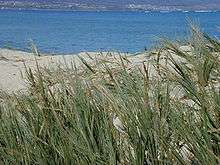Sporobolus virginicus
| Sporobolus virginicus | |
|---|---|
 | |
| Scientific classification | |
| Kingdom: | Plantae |
| (unranked): | Angiosperms |
| (unranked): | Monocots |
| Subclass: | Commelinids |
| Order: | Poales |
| Family: | Poaceae |
| Genus: | Sporobolus |
| Species: | S. virginicus |
| Binomial name | |
| Sporobolus virginicus (L.) Kunth | |
| Wikimedia Commons has media related to Sporobolus virginicus. |
Sporobolus virginicus, known by numerous common names including seashore dropseed,[1] marine couch, sand couch, salt couch grass, saltwater couch, coastal rat-tail grass, and nioaka, is a species of grass with a wide distribution.
Description
It is a spreading perennial tussock grass from 10 to 50 centimetres in height. Its flowers are green or purple. It reproduces asexually by use of both stolons and rhizomes.[2]
Taxonomy
It was originally published by Carl Linnaeus in 1753, under the name Agrostis virginicus. It was transferred into Sporobolus by Karl Sigismund Kunth in 1829. It has a great many synonyms.[3]
Distribution and habitat
It grows in Australia, New Zealand, many Pacific Islands, the Caribbean, Africa, India, China and Indonesia. It is widespread in Australia,[4] occurring in every state, although in New South Wales it is considered naturalised.[5]
External links
References
- ↑ "Sporobolus virginicus". Natural Resources Conservation Service PLANTS Database. USDA. Retrieved 27 November 2015.
- ↑ "Sporobolus virginicus (L.) Kunth". FloraBase. Western Australian Government Department of Parks and Wildlife.
- ↑ "Sporobolus virginicus (L.) Kunth". Australian Plant Name Index (APNI), IBIS database. Centre for Plant Biodiversity Research, Australian Government.
- ↑ p24 It is the most wildly distributed saltmarsh plant in Australia Saintilan, Neil; CSIRO (2009), Australian saltmarsh ecology, CSIRO Publishing, ISBN 978-0-643-09684-4
- ↑ S. W. L. Jacobs & K. L. McClay. "New South Wales Flora Online: Sporobolus virginicus". Royal Botanic Gardens & Domain Trust, Sydney, Australia.